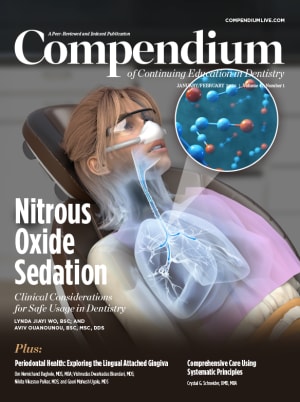EXPAREL® May Allow Dentists to Manage Post-Surgical Pain With Fewer Opioids
The growing opioid epidemic in the United States has led medical professionals to seek out alternative options for managing a patient's pain. For dentists, these postoperative medications are primarily needed after surgical procedures. The American Dental Association issued a statement on the use of opioids in dentistry that essentially instructs dentists who are considering prescribing opioids to conduct a medical and dental history of the patient to determine current medications, potential drug interactions, and any history of substance abuse. The statement also encourages dentists to consider nonsteroidal anti-inflammatory analgesics as the first-line therapy for acute pain management.
"Oral surgeons prescribe a lot of drugs; there's no getting around it. We do many surgical procedures that unfortunately induce pain," says Dale J. Misiek, DMD, an oral surgeon at Carolinas Center for Oral and Facial Surgery, which has various offices in North and South Carolina. The practice offers a range of services from wisdom teeth removal to jaw and cleft lip surgery-procedures that require the use of postoperative pain medication.
"The problem is that we don't know how many painkillers a patient will need on an individual basis," he explains.
Pacira Pharmaceuticals, Inc. has developed EXPAREL® (bupivacaine liposome injectable suspension), an FDA-approved, long-lasting, non-opioid analgesic. When used as part of a multimodal approach to pain management, EXPAREL provides effective postsurgical pain relief and helps reduce the need for opioids after surgery.
"This product improves post-op pain for patients," Misiek says. Additionally, he notes, by reducing narcotic painkillers, there are fewer or no leftover pills at risk of being misused.
EXPAREL is indicated for single-dose administration into the surgical site to produce postsurgical analgesia. Available as a 20-mL or 10-mL single-use vial, it works locally at the surgical site and uses DepoFoam® drug delivery technology, whereby following injection, microscopic, lipid-based particles gradually release over time as the lipid membranes are reorganized, prolonging the duration of action of bupivacaine. DepoFoam offers flexible delivery and can be designed to provide an immediate-dose followed by sustained delivery.
"Having a non-opioid, long-acting local anesthetic at our disposal has changed the way we manage pain for our patients," Misiek affirms.
Because EXPAREL does not diffuse throughout tissues in the same manner as traditional bupivacaine, Pacira recommends administering this product using a series of injections to effectively cover the surgical area. Further, the company states EXPAREL should be injected with a 25-gauge or larger-bore needle. The recommended dose of EXPAREL is based on several factors, including the size of the surgical site, the volume required to cover the area, and individual patient factors that may impact the safety of an amide local anesthetic.
In the past few years, the media has increasingly brought attention to the opioid crisis, and patients today have a greater awareness of the risks of opioids. For example, Misiek points out that according to a WCNC.com report, prescription drug addiction claimed the lives of nearly 1,400 North Carolinians in 2015 alone. As a result of this heightened scrutiny, patients increasingly are mindful of avoiding narcotic drugs and the problems associated with them, including addiction.
"Limiting the number of prescriptions available to patients helps serve the effort of curbing opioid abuse," Misiek suggests. "When a patient's pain is under control, his or her body can work on healing. The focus is taken off the pain, and the dependency on pain medication is reduced."
With the continued introduction of non-narcotic pain relievers such as EXPAREL, practitioners can be better equipped to provide patients with alternatives to opioids, helping to contribute to patient safety and the fight against the opioid crisis, Misiek concludes.
Pacira Pharmaceuticals, Inc.
5 Sylvan Way, Parsippany, NJ 07054
973-254-3560
exparel.com
PP-EX-US-3497
